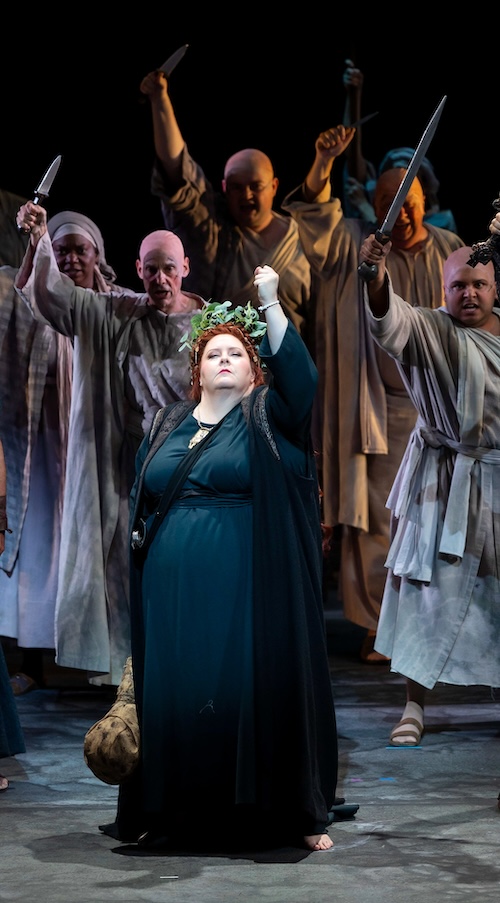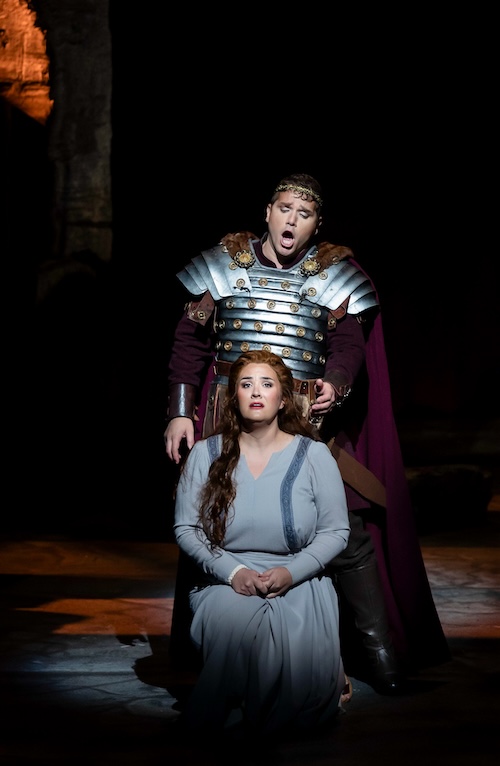With Meade as a starry sub, Palm Beach Opera soars in season finale of “Norma”

Angela Meade sang the title role of Bellini’s Norma at Palm Beach Opera Friday night at the Kravis Center. Photo: Bruce Bennett
Thanks to a last-minute casting change, one of the 21st century’s great exponents of the title role of Bellini’s Norma performed Friday in Palm Beach Opera’s final production of the season.
Angela Meade, who has sung the role to acclaim at the Metropolitan Opera, took the stage at the Kravis Center in West Palm Beach to portray the troubled Druid priestess. The soprano substituted for Jessica Pratt, who canceled earlier this week due to illness.
Meade dominated the performance, with a big plush voice that occasionally overpowered other singers yet with the ability to express the inward feelings of a woman who was constantly on her own stage in front of her people.
Set in Roman-occupied Gaul, the 1831 opera tells the story of a high priestess who secretly had two children with the Roman leader Pollione. As the Gauls wait restlessly for the order to rise up against their oppressors, Pollione falls in love with a young novice priestess, and Norma is torn between commitments to her fellow Gauls, to herself and to her children.
The two acts took place on a unit set of rustic buildings of stone and wood beams from Cincinnati Opera, with a background of steep snowy mountains. Skillful lighting changed the setting from daylight to night to dawn to a hellish red. The last few minutes would appeal to any opera-goer who appreciates visual spectacle.
Through the opera, Norma takes on many roles—imperious priestess, jilted lover, troubled mother and devoted friend. But through all of these, she must sing Bellini’s long unbroken lines of melody, and Meade delivered the vocal goods, with a strong sense of the role’s emotional depths.
The most famous aria, of course, is “Casta Diva,” Norma’s prayer to the moon. Meade took an unhurried pace, luxuriating in the melody’s climactic ascent with a smooth legato and big, glossy sound. Despite the richness of her voice, her ornamentations came off as precise and accurate. Particularly moving was the melody’s return, when she dropped her voice and sang quietly but with effortless tone production.
Beyond this famous aria, Meade gave a convincing account of Norma’s emotional turmoil, singing with quiet urgency at the Act 2 opening as she contemplates the mercy killing of her own sons, soft desperation as she implores Pollione to care for them and brave resignation as she prepares to meet her fate at the end. The role will be sung Saturday by Marigona Qerkezi.

Ashley Dixon is Adalgisa and Paulo Fanale Pollione in Palm Beach Opera’s Norma. Photo: Bruce Bennett
Stage director Keturah Stickann created an atmosphere that was richly evocative of pagan ritual and implied violence, with processions of robed figures and the tendency of characters to pull knives and brandish swords and axes. This gave the setting the feeling of a land on the brink of crisis, enhancing the power of the music and drama.
The young mezzo-soprano Ashley Dixon made a winsome, sweet-toned Adalgisa. Her agile phrasing, emotional commitment and appealing stage presence produced a convincing portrait of the young aspiring priestess.
Despite the late substitution of Meade as Norma, the two singers seemed to have a musical and personal rapport—their easy camaraderie coming off as more worthy and genuine than whatever either of them had going on with Pollione. Their extended duet, in which they wrestle with their conflicts over their vows, Pollione and their personal relationship, was one of the evening’s highlights. The role will be sung Saturday by Anne Marie Stanley.
The Italian tenor Paulo Fanale was merely serviceable in the role of Pollione, the love interest of both Norma and Adalgisa. But his voice was dry, with unsteady high notes. And at times his singing was underpowered, allowing Meade to completely drown him toward the end. The role will be sung Saturday by Moisés Salazar.
The performance was led by the Italian conductor Carlo Montanaro. Under him, the orchestra provided a crackling performance of the Overture and atmospheric accounts of the opera’s dark, ominous orchestral passages. And while the orchestra always stayed out of the way of the singers, the ensemble provided energetic support throughout.
As Oroveso, Norma’s father and leader of the Gauls, the bass-baritone Nicolas Testé sang with effortless authority and a dark vocal gleam. Clad in red and gold, carrying a staff, he was a convincing portrait of tribal leadership.
The chorus plays a crucial role as the Gauls who are impatient to take up arms against the Romans. The Palm Beach Opera chorus delivered a stirring performance, technically sound and emotionally convincing. As they sang “Guerra, guerra” (“To battle, to battle”), holding up a motley collection of knives, swords and axes they painted a portrait of bravery that appeared unlikely to end well.
Maria Vasilevskaya and Devin Eatmon both did fine jobs in the smaller roles of Clotilde and Flavio.
Prior to the performance, the Palm Beach company announced next year’s season: Gounod’s Roméo et Juliette, Verdi’s La Traviata and Mozart’s The Marriage of Figaro.
Norma will be repeated 7:30 p.m. Saturday (with alternate cast) and 2 p.m. Sunday. pbopera.org.
Posted in Performances
One Response to “With Meade as a starry sub, Palm Beach Opera soars in season finale of “Norma””
Leave a Comment
Sat Apr 6, 2024
at 11:48 am
1 Comment
Posted Apr 09, 2024 at 7:58 pm by William Birdsall
I have now seen Angela Meade as Norma 3 different times. In 2017 at the Met where she sang a nice, but placid Norma. Then in March 2023 she jumped in for Yoncheva when I was in NY to see Yoncheva in the role.
Meade was very fiery and energetic. A totally different Norma, in my opinion.
I thought maybe that was a fluke, but she was on fire again and showing off her good lower register at PB Opera this past Friday. I am astonished at how she is so different. I like the change. She sings less “pretty,” but she is much more fiery. I loved it this past weekend.